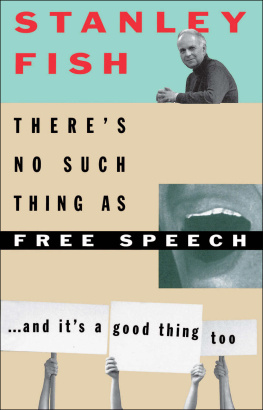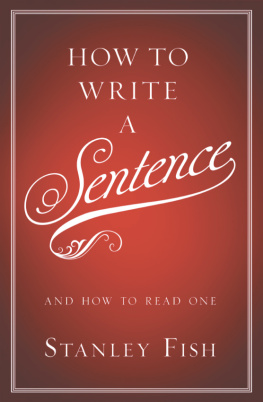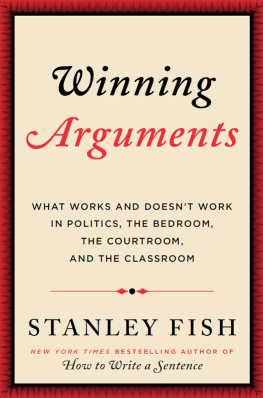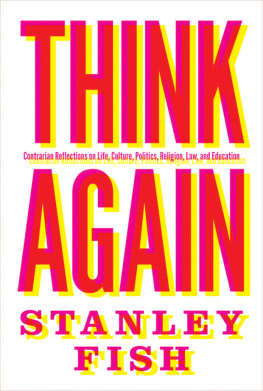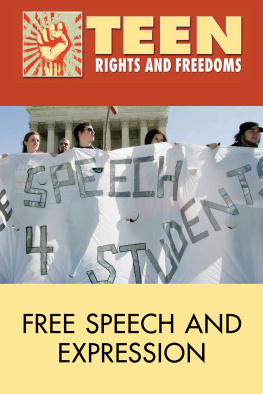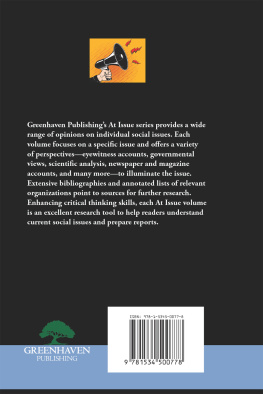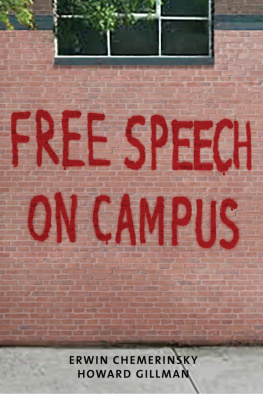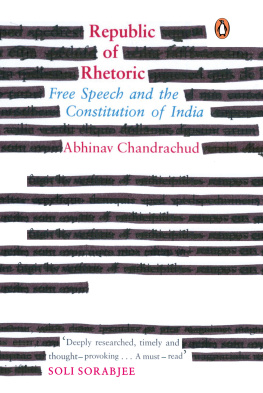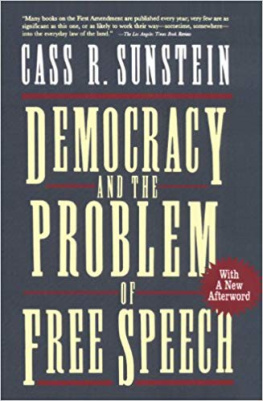Stanley Fish - Theres No Such Thing As Free Speech
Here you can read online Stanley Fish - Theres No Such Thing As Free Speech full text of the book (entire story) in english for free. Download pdf and epub, get meaning, cover and reviews about this ebook. year: 1994, publisher: Oxford University Press, genre: Politics. Description of the work, (preface) as well as reviews are available. Best literature library LitArk.com created for fans of good reading and offers a wide selection of genres:
Romance novel
Science fiction
Adventure
Detective
Science
History
Home and family
Prose
Art
Politics
Computer
Non-fiction
Religion
Business
Children
Humor
Choose a favorite category and find really read worthwhile books. Enjoy immersion in the world of imagination, feel the emotions of the characters or learn something new for yourself, make an fascinating discovery.
- Book:Theres No Such Thing As Free Speech
- Author:
- Publisher:Oxford University Press
- Genre:
- Year:1994
- Rating:3 / 5
- Favourites:Add to favourites
- Your mark:
- 60
- 1
- 2
- 3
- 4
- 5
Theres No Such Thing As Free Speech: summary, description and annotation
We offer to read an annotation, description, summary or preface (depends on what the author of the book "Theres No Such Thing As Free Speech" wrote himself). If you haven't found the necessary information about the book — write in the comments, we will try to find it.
Theres No Such Thing As Free Speech — read online for free the complete book (whole text) full work
Below is the text of the book, divided by pages. System saving the place of the last page read, allows you to conveniently read the book "Theres No Such Thing As Free Speech" online for free, without having to search again every time where you left off. Put a bookmark, and you can go to the page where you finished reading at any time.
Font size:
Interval:
Bookmark:
THERES NO SUCH THING
AS FREE SPEECH
AS FREE SPEECH
AND ITS A GOOD THING, TOO
STANLEY FISH


Oxford New York
Athens Auckland Bangkok Bombay
Calcutta Cape Town Dar es Salaam Delhi
Florence Hong Kong Istanbul Karachi
Kuala Lumpur Madras Madrid Melbourne
Mexico City Nairobi Paris Singapore
Taipei Tokyo Toronto
and associated companies in
Berlin Ibadan
Copyright 1994 by Stanley Fish
First published in 1994 by Oxford University Press, Inc.,
198 Madison Avenue, New York, New York 100164314
First issued as an Oxford University Press paperback, 1994
Oxford is a registered trademark of Oxford University Press
All rights reserved. No part of this publication may be reproduced,
stored in a retrieval system, or transmitted, in any form or by any means,
electronic, mechanical, photocopying, recording, or otherwise,
without the prior permission of Oxford University Press.
Library of Congress Cataloging-in-Publication Data
Fish, Stanley Eugene.
Theres no such thing as free speech/
Stanley Fish.
p. cm. Includes index.
ISBN 0 195080181
ISBN 0195093836 (PBK.)
1. Freedom of speech. 2. Freedom of speechUnited States.
3. Academic freedom. 4. Academic freedomUnited States.
I. Title. Z657.F5 1994 323.4430973dc20 9315347
98765
Printed in the United States of America
For Jane
and to the memory of
Max Fish and Henry Parry,
two honest men
When she was the chair of the National Endowment for the Humanities, Lynne Cheney used to delight in pointing out that her views on the curriculum, literary value, and the canon were shared not only by fellow conservatives, but by liberals like Arthur Schlesinger and the occasional Marxist like Eugene Genovese. In Cheneys eyes that broad-based consensus was a clear indication that she was simply voicing common sense in the face of a radical, nihilistic assault on the entire fabric of Western Civilization. Although she never quite put it this way, the message was unmistakable: if persons so far apart on the political spectrum share a distaste for an agenda-call it multiculturalism, postmodernism, deconstruction, or political correctnessthat agenda is beyond the pale and should be rejected by all reasonable people.
The matter, however, is a bit more complicated than that, for conservative ideologues and liberal stalwarts recoil from the same thing not because they are similarly clear-sighted but because they are committed to a similar structure of thought, although they would fill it out in different ways. It is a structure that opposes the essential to the accidental and enjoins us to be vigilant lest the latter overwhelm the former. A Lynne Cheney and a Eugene Genovese might disagree as to what the essential is and where the danger to its flourishing lies, but they will agree on the obligation to protect it and they will join forces against anyone who argues, as I do, that the essential is a rhetorical category whose shape varies with the contingencies of history and circumstance. In a debate about the curriculum, for example, there might be arguments about which texts will produce the desired resultthe formation of a virtuous citizenry or a commonwealth free of oppressionbut all parties will believe in the project and will reject any suggestion that there is nothing general to say about the relationship between pedagogical choices and preferred outcomes and that finally one can only respond to the question provisionally, by determining what might work at this time, in this place, and for this momentary purpose. This refusal to come down on one side or the other of an issue posed in absolute terms will always be heard as some kind of relativism or solipsism or nihilism and as the subordination of value to political expediency, but in the chapters that follow I assert that it is nothing of the kind and that values, rather than being opposed to political commitment, grow only in its soil and wither in the arid atmosphere of bodiless abstraction, whether that abstraction is named reason, merit, fairness, or procedural neutrality. The upshot of this is not, as some would have it, that anything goes or that words have no meaning, but that the line between what is permitted and what is to be spurned is always being drawn and redrawn and that structures of constraint are simultaneously always in place and always subject to revision if the times call for it and resources are up to it. Neither the defender of the status quo nor the proponent of radical change will find much comfort in these pages, which issue no clarion calls and recommend (if they recommend anything) only that we resist overheated and overdramatic characterizations of our situation, whether they come from the left or the right.
I would expect that for many readers the most distressing thing about these essays will be the skepticism with which they view the invocation of high-sounding words and phrases like reason, merit, fairness, neutrality, free speech, color blind, level playing field, and tolerance. My argument is that when such words and phrases are invoked, it is almost always as part of an effort to deprive moral and legal problems of their histories so that merely formal calculations can then be performed on phenomena that have been flattened out and no longer have their real-world shape. An exemplary (it is a bad example) instance of this practice has just been provided for us by the Supreme Court in its recent (June 28, 1993) decision that the creation by the North Carolina legislature of two black majority districts may be unconstitutional because it smacks too much of race consciousness. It is unsettling, observes Justice OConnor in her majority opinion, how closely the North Carolina plan resembles the most egregious racial gerrymanders of the past. But the resemblance that strikes Justice OConnor so forcibly only emerges if one has forgotten or bracketed out everything about the past that makes the present an intelligible (and moral) response to it. Specifically, one must forget that past redistricting practices were devised with the intention of disenfranchising an already disadvantaged minority; discrimination was not a byproduct of the policy, but its goal, and a goal whose achievement can be measured by the fact (noted by Justice White in his eloquent dissent) that it is only now, as a result of the plan under attack, that the State has sent its first black representatives since Reconstruction to the United States Congress.
This is to say, the goal of the North Carolina policy is to bring African Americans into the political process, and the idea that by doing so a white majority that remains a majority in a disproportionate number of congressional districts will have been unduly deprived of its influence on that process is, as White forthrightly says, a fiction. It is a fiction that can only be maintained if one removes the present fact situation from its context and inserts it into the game I call moral algebra, a game that is played by fixing on an abstract quality and declaring all practices that display or fail to display that quality equivalent. In this case Justice OConnor plays the game by substituting for the question What is the purpose of the Voting Rights Act and how does the North Carolina Plan square with that purpose? the question Does the North Carolina Plan exhibit race consciousness? When this second question has yielded an affirmative answer (and given the fact of the Voting Rights Act,
Next pageFont size:
Interval:
Bookmark:
Similar books «Theres No Such Thing As Free Speech»
Look at similar books to Theres No Such Thing As Free Speech. We have selected literature similar in name and meaning in the hope of providing readers with more options to find new, interesting, not yet read works.
Discussion, reviews of the book Theres No Such Thing As Free Speech and just readers' own opinions. Leave your comments, write what you think about the work, its meaning or the main characters. Specify what exactly you liked and what you didn't like, and why you think so.

